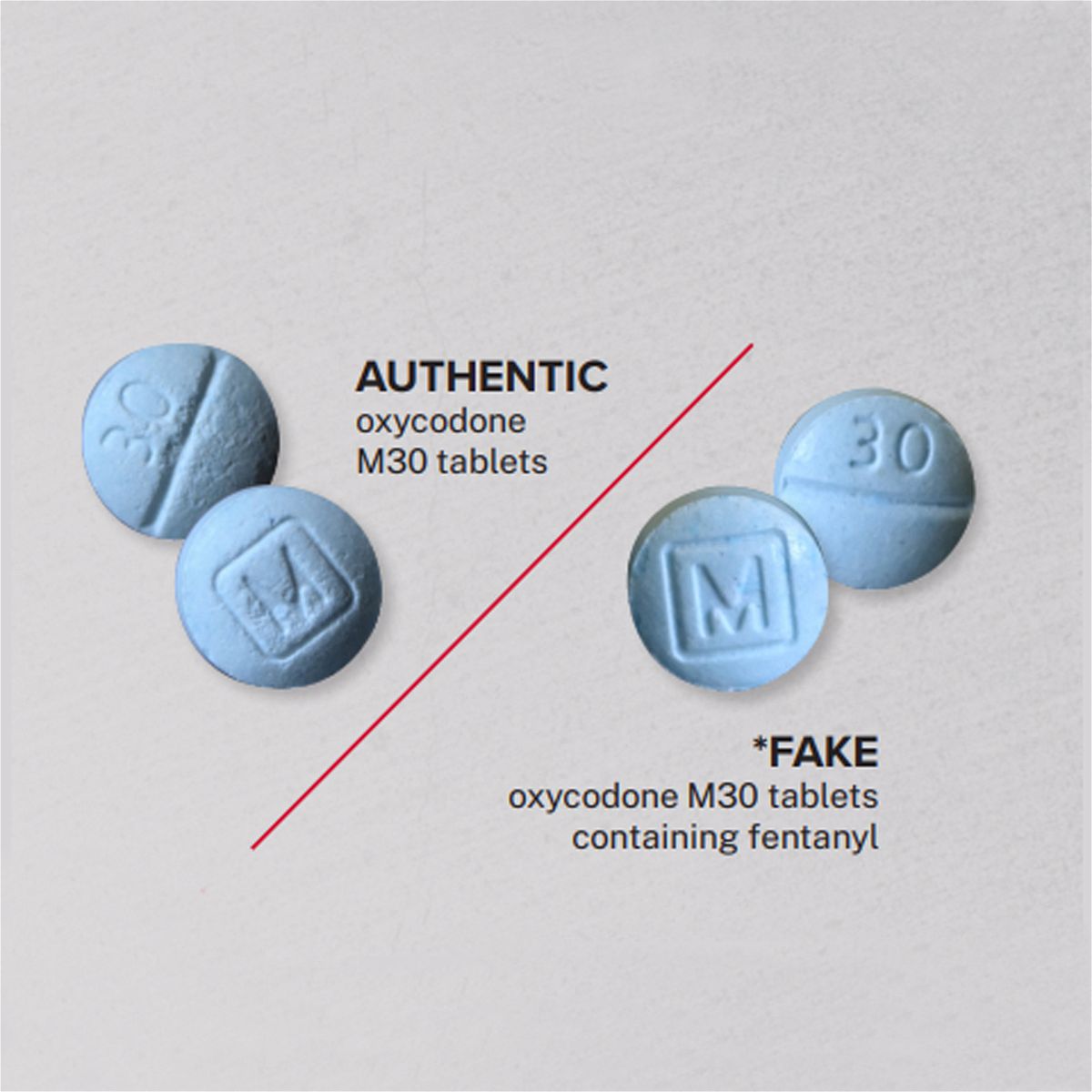Fentanyl killed their son. Now they’re begging parents to understand the dangers

By Josh Campbell, CNN
It was every parent’s worst nightmare.
Two days after Christmas 2020, Chris Didier went into his son Zach’s bedroom in their home near Sacramento. The accomplished student, school theater actor and athlete was unresponsive at his desk — his head lying on his arm.
“I could feel before I even touched him that something was horribly wrong,” said Chris.
Chris, who is retired from the Air Force, said his first aid training kicked in and he immediately began CPR, instructing another of his sons to call 911.
“I will never forget the shock on our son Sam’s face when he came to bring the phone in, seeing his lifeless brother on the floor,” said Chris.
Chris’s eyes filled with tears as he sat next to Zach’s mother, Laura, inside their son’s former high school theater classroom, recounting to CNN the tragic day that shattered their lives.
Medics arrived at the home and began trying to resuscitate Zach, but they stopped after mere minutes.
“They looked at me and said, ‘I’m sorry,’ and I refused to accept that,” said Chris. “It was something that I adamantly could not accept.”
He grabbed a medic’s defibrillator and resumed CPR, desperately trying to revive his son, and begged the medical personnel in the room to help.
“And when they didn’t,” said Chris, “I started trying to talk to Zach and begged him: Don’t go. Come back. Please come back. Do not go.”
One of the first responders eventually pulled Chris away, gently telling him it was time to let go.
“And that was my all-time low in my life,” he said. “I lost it there and I cried inconsolably.”
The couple’s daughter called Laura and told her to get to the house as Zach was in trouble.
But when she arrived, seeing the family in the driveway and no ambulance at the home, Laura feared the worst.
“I walked up,” Laura recounted, “and Chris said, ‘Our baby is gone.'”
Debilitating confusion
The Placer County coroner soon arrived and spent several hours looking around the home and examining Zach’s room.
They eventually came downstairs and told Chris and Laura the cause of death was a mystery, but they were ruling out suicide. The medical examiner said they had two initial theories: an undetected medical condition, or poisoning from fentanyl.
Chris and Laura said the possibility of Zach dying from fentanyl spiraled them into “debilitating confusion” as they tried to process the theory.
Chris said he knew fentanyl was some kind of powerful synthetic opioid, but that he “would have never imagined it would be in our home, (let) alone be in Zach’s body.”
Laura said it felt like someone was speaking a foreign language to her.
“Why would they even speculate that?” she said. “Zach doesn’t use drugs. Zach’s a great kid. How would he even get ahold of it?”
After examining Zach’s phone, investigators found their answer.
In December 2020, following months of pandemic lockdowns, remote learning and severe disruption and stress placed upon on children, Chris said, a local shopping mall had finally reopened.
Using the popular social media app Snapchat, Zach and a friend made contact with a drug dealer who was advertising various products he was selling near the mall’s food court. The teens purchased what they were told was the prescription pain reliever Percocet.
“But they were duped,” Chris said. “They were not sold that. They were instead sold a counterfeit pill.”
Investigators determined the pill, in fact, contained fentanyl.
Dying ‘within seconds to minutes’
Overdoses have skyrocketed across the country with deaths involving synthetic opioids such as fentanyl jumping by a marked 22% in 2021, according to the CDC.
The deadly drug fentanyl has increasingly made its way into the US drug supply, experts say, in large part due to dealers deceiving buyers into believing they are buying other popular and less lethal prescription medication.
“Fentanyl is a highly potent opioid — it’s at least 50 times more potent than heroin,” said Dr. Scott Hadland, chief of adolescent and young adult medicine at Boston’s Mass General for Children Hospital.
“Fentanyl is so potent that teens, particularly teens who have never used an opioid before and have no tolerance to them, can die really quickly. We’re talking within seconds to minutes.”
And while new CDC data indicate the most common place where teens overdose is at home, a modern challenge is further putting children at risk: social media.
“A lot of teens actually buy their drugs off of social media now, including platforms like Instagram, Snapchat or TikTok,” Hadland said, “and that makes this a lot more challenging because often this is happening without parents or other people knowing about it.”
In addition to wanting to experiment with drugs, experts say there are other key reasons why teens turn to pills.
“About two out of every five teens who overdose has a history of struggling with depression, anxiety or other mental health problems,” said Hadland, “and in many cases these problems have gone unaddressed.”
Hadland said it is critical that parents talk to their teens about fentanyl, and approach the conversation in a spirit of curiosity, asking “thoughtful, open-ended questions” about their knowledge of the drug, and do more listening than lecturing. Parents should also seek to create a safe space where teens can confide in them if they are facing mental health or substance abuse problems.
In Zach Didier’s case, his parents said there were no warning signs, and they can only speculate why he sought out the prescription drug Percocet, but they think pain management may have been a possibility.
“Zach was a recognized and respected multi-sport athlete,” his father, Chris, said, “and maybe taking a pharmaceutical opioid like Percocet to manage a moderate amount of pain can give you a good workout without feeling the pain. We don’t know.”
‘You’re a customer for as long as you live’
With the rise in fentanyl-related deaths, many police and prosecutors around the nation have begun dedicating more personnel to aggressively target traffickers and dealers.
This year, the White House also directed resources to help state and local entities more effectively counter the harmful effects of the opioid crisis.
“It’s time we treat addiction like any other disease,” said President Joe Biden. “And at the same time, we are disrupting drug traffickers’ financial networks, supply chains and delivery routes, including on the internet.”
In Los Angeles County alone, health officials recently announced accidental fentanyl overdoses spiked over 1,200% from 2016 through 2021.
CNN met up with a Los Angeles Police Department narcotics detective finishing a long day serving warrants and conducting surveillance. The plainclothes officer, who is not being identified as his work involves undercover operations, described the trends officers are seeing as they work to disrupt trafficking networks.
He said major fentanyl trafficking routes have mirrored the way drugs like cocaine, methamphetamines and heroin have entered the country: produced in China, shipped to Mexico, and smuggled into the United States.
But unlike other types of drugs that users know they are ingesting, the officer says deception is at the heart of most fentanyl sales.
“The number one problem is counterfeit pills,” he said, which are often made to resemble the size, shape, color and markings of legitimate prescription drugs. “It’s difficult to distinguish which one is the real one and which one is the fake tablet. If you’re buying it on a social media account, or you’re buying it from somebody on the street or a friend, then most likely it’s going to be counterfeit.”
Asked why dealers would aggressively sell a product with a high potential to kill their customers, the LAPD detective said that is not a paramount issue for cartels and those selling fentanyl to teens.
“It all comes down to money, it all comes down to profit,” he said, explaining that dealers can purchase a pill for two dollars and turn around and sell it for $15-20. “The dealer’s main objective is to get you hooked, and if you don’t die from it, then you’re a customer for as long as you live.”
The dealer who sold Zach Didier the fatal fentanyl dose was arrested and sentenced to 17 years in prison.
“The message to dealers is that we are fed up,” said Placer County District Attorney Morgan Gire. “We are tired of seeing young people dying in our communities, and we will take a very aggressive approach to those who are seeking to peddle these deadly poisons in our community. And if you sell in our community and someone dies as a result, you will very likely be charged with murder.”
But while Gire has advocated for aggressive prosecution against dealers, he says prosecution alone won’t solve the fentanyl crisis.
“The solution,” he said, “will be education and awareness and talking to parents, talking to teachers.”
‘I hope we reach them’
Warning families about the dangers of fentanyl has become a life mission for Zach’s parents, who now spend countless hours going into schools telling their shattering story.
“I can’t sit here and not effect change, not be part of the solution here in educating kids and educating parents about what this danger is,” said Laura.
Despite the stigma she says can occur when a parent talks about losing a child to drugs, and the fear that Zach’s parents might somehow “tarnish his memory” by telling the story of a “stellar young man” who died from fentanyl, Laura said she knows Zach would want her to speak out.
She said she believes Zach would tell her, “I don’t care about any of that. I want you to warn my peers. I want you to tell them what’s going on, tell them how serious this is.”
The Didiers said they believe their efforts have already saved lives. In one example, they were contacted by a stranger who talked to their own child about fentanyl after hearing Zach’s story.
“Right then and there (the teen) admitted that they had just purchased a pill off Snapchat,” Chris said as he recounted the parent’s gripping story. “And guess what? They had (the pill) tested and there was a lethal amount of fentanyl. Had they not heard that story, they could have been the next victim.”
CNN was invited to accompany the Didiers at fentanyl-focused school assemblies organized by the Placer County District Attorney’s office this month in northern California. Each event followed the same pattern: the raucous noise of teens finding and settling into their seats, followed by near total silence as Chris and Laura began talking about the loss of their son.
“As hard as it is to talk about it and as hard as it is to share the story, I feel him with me when I do it,” Laura said, describing how she channels Zach’s strength and his desire to always help people. “I feel him helping me find the words even.”
Asked what goes through her mind before she steps before an audience of children to tell her heartbreaking story, Laura said, “I hope we reach them. … I see their faces and I just scan the room and they’re listening and absorbing it. And I just think, ‘God, please let us reach them.'”
The-CNN-Wire
™ & © 2022 Cable News Network, Inc., a Warner Bros. Discovery Company. All rights reserved.
CNN’s Elizabeth Joseph, Jack Hannah and Deidre McPhillips contributed to this report



